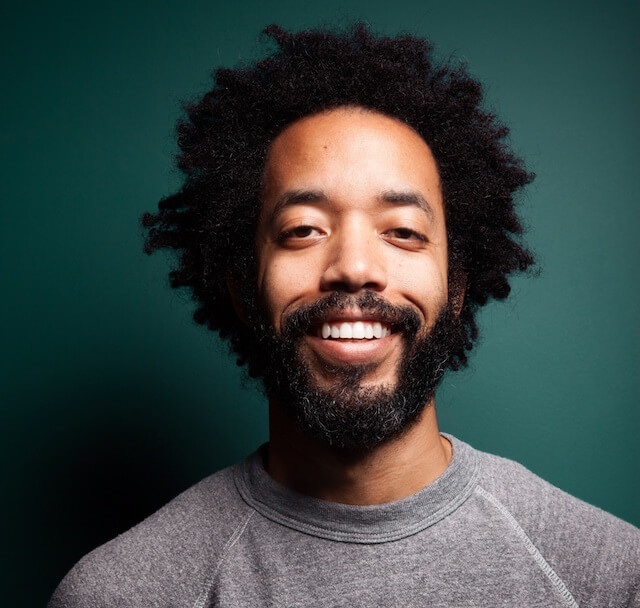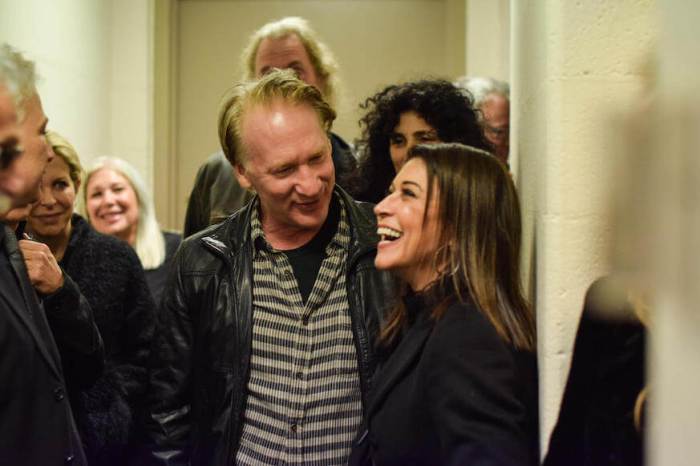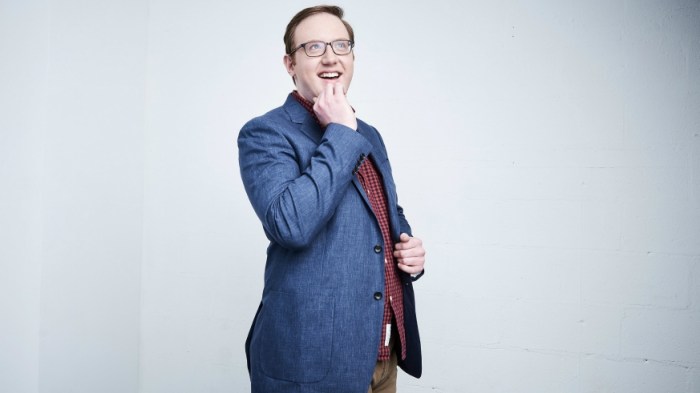Wyatt Cenac is currently touring behind his second stand-up special, “Wyatt Cenac: Brooklyn,” which now streams on Netflix and is available for purchase as a vinyl record. It’s a good chance to talk to the comic, television star and sometime actor about not just the borough for which he named his special, talking serious, the very good indie — 2008’s “Medicine for Melancholy” — he starred in and where his old alma mater, “The Daily Show,” which he left in 2012, may or may not head after it loses its longtime host. Do you worry about doing material about Brooklyn in places that are far from New York?
The hope and the goal is the things I’m talking about are relatable outside of the borough of Brooklyn. Brooklyn has been commodified in a way that you have television shows set in Brooklyn or which have Brooklyn in the title. You have newspapers doing articles asking, “Is this city the new Brooklyn?” Even if people have never been to New York, people clearly understand it — and can be engaged with the idea of this weird borough where there’s now a mayonnaise shop. People have this cartoonish idea of what Brooklyn is as a brand, but there’s also a major problem here in terms of income gaps — that a historically low-income borough now has the highest cost of living in America. That’s another conversation to have: If I am a person coming into a neighborhood with money, what is my responsibility and what is my role? There’s a difference between moving into a neighborhood and trying to terraform it. If I am a person who moves into a neighborhood with a sh—-ton of money, are the things I want the things only I want, or are they the things everyone in the neighborhood wants? Am I taking the time to get to know the neighborhood and not just inject my tastes and my beliefs into it? I have to accept and deal with what the neighborhood already is. That doesn’t happen as much as when seven hedgefund managers decide to move onto a street where everyone’s lived for the last 20 years. What’s happening more often than not is people see the potential of what could be as opposed to the potential of what it is. Instead poor neighborhoods suddenly see nice restaurants opening, but usually as a sign of further development to come.
No one wants to live in a depressed neighborhood forever. Everyone wants to have a nice restaurant they can walk to. But is that restaurant making them feel unwelcome? I live in a landmark brownstone. When my landladies moved in a dozen years ago, because the building was landmarked, they had to rebuild the facade, because it was buckling. Next door was a woman who lived on the street longer than anyone else. Her facade was buckling, but she didn’t have the resources to repair it. Even though it’s a landmark building, the city did not provide her with any aid to rebuild it. In “Brooklyn,” you sometimes segue into more serious fare, like talking about your father, who was murdered when you were four. Was there a hesitancy to get so personal?
I wasn’t afraid of it. I think there’s the expectation that if you’re a comedian you just make them laugh. I get that. But what I have always enjoyed from comedians is the way they challenge the audience. When you look at somebody like Richard Pryor, Pryor challenged people in so many ways. Things could get emotional, things could get small, things could get big and crazy and wild. Look at Joan Rivers, who could talk about her divorces, her plastic surgery. Here was a woman who was running to the things that other women at the time were afraid of talking about. Getting on the stage and getting in front of people is to take yourself to places and discover things in the room with the audience. Before you started on “The Daily Show,” you starred in the indie drama “Medicine for Melancholy.” Do you see yourself doing other serious acting roles?
I don’t know. That’s up to a director more than me. [Laughs] I feel I got very lucky with “Medicine for Melancholy.” I am not an actor by trade. Even in that film I was not forced to push myself in the ways really talented actors are. I got to be a slightly different version of myself. I don’t necessarily know if would trust myself doing “Interstellar 2.” My instincts are always going to be to cut the tension, make a joke. I think on some level I worry that if I did something else I would do the wrong thing and get exposed, that people would think, “He got lucky that one time. This thing he’s doing now is a trainwreck.” “Medicine for Melancholy” is such a smart film about race. Do you feel there’s more autonomy for black voices in movies these days?
I don’t know if I want to say it’s getting better, because that does disservice to all the other voices who have made films throughout history. I don’t want to say it’s getting better at the expense of Gordon Parks. What I see happening now is more of these projects are being accepted by a wider audience. There’s “Selma.” But even in the press people are saying it has a horribly inaccurate portrayal of LBJ. Nobody went that hard on “Argo” for historical inaccuracies, and “Argo” was full of them. Some commentators have claimed the film paints Johnson as a villain, but that that’s a gross simplification of what’s actually onscreen.
He’s not a villain at all. He’s a man hamstrung by the position of being president. In 30 years if someone is making a movie about the gay rights movement during the Obama presidency, I imagine he’ll be portrayed similarly. He has to say his views on homosexuality and gay rights are “evolving,” when I think anyone with half a brain knew he couldn’t do that on day one. If anything “Selma” gave me an added perspective on what a thin rope a president must walk on. If you make gay marriage legal on the first day, you probably don’t get a second term. To watch “Selma” is to think LBJ has a horrible job. The presidency is the worst job in America.
It is! It’s the worst job! There is not a worse job. I imagine there are days a president thinks, “You know what? Cleaning up septic tanks might not be as bad. I’m dealing with s—, but I don’t have to deal with as many s—ty people.” Do you find that you pay as much attention to the news as you did when you worked at “The Daily Show”?
Not as much. Thankfully. [Laughs] I still pay attention in as much as I see what’s going on, I read the paper, I look online. I’ll watch the nightly news. But I try not get into the fanboy minutiae that is involved in watching the 24 news networks. There was a time when I knew all the people who worked on them. The third stringers on Fox News, I could name them. Now I don’t care, and I’m glad. [Laughs] Do you any idea where the show will head once Jon Stewart has left?
I don’t know. That’s ultimately in the hands of whoever gets the show next. I think unfortunately what’s happening right now, so many people are speculating and few are appreciating what is happening right now. There was an initial shock when he announced [his leaving] of people saying, “Oh my god, Jon’s leaving, I’m so sad.” That lasted about an hour. Then the conversation shifted to who’s going to replace him. And he hasn’t even said when he’s leaving. They’ve already packed his bags. There’s a giant cottage industry in journalism that’s pure speculation and not about the products themselves. They dote more on movies that haven’t even been made yet than the movies when they actually arrive. We can all speculate. Maybe what we don’t need is speculation. Maybe we can just use facts and learn to be comfortable with them.
It was sad to see Jessica Williams get pounced on as the next prospective host, even though she’d voiced no interest in it.
This is the network’s decision. None of them are the network. At the moment everyone is yelling at people like contestants on “The Bachelor.” Comedy Central are making a business decision. They don’t have any debt to the audience. The audience wants a lot of things. They might want an hour of “Tosh.0.” If the numbers bear that out, that an hour of “Tosh.0” gets them way more ad revenues than this show does, then the studio on 52nd Street has to shut down and a lot of people have to clean out their desks and find new jobs. The decision is going to be made by executives who get money from advertisers, and they’re making the best decision for those advertisers. TV shows are just the sausage that is wrapped around the pill that are ads. Most of the passion concerned the lack of diversity in late night television.
There have been minorities hosting shows in late night. Chelsea Handler hosted a show, W. Kamau Bell hosted a show, Arsenio, George Lopez hosted shows. When we talk about the lack of diversity in late night, we exclude them and their shows from the conversation. We say we want diversity on television, but as audiences are we doing enough to support these things? We can say, and rightfully so, that people should look beyond the traditional white male host. But we also have to ask, as an audience, are we so conditioned that all we will watch is a white male host? We had George Lopez, we didn’t watch him. We didn’t watch Kamau. If you asked for something, you wanted it, you’d better support the s— out of it. As much as I would love to work in television again, I can say wholeheartedly my fear is that if I were to get another opportunity, would I be supported? I have to wonder if that fear is in the minds of network executives, and that may be why some things I’ve tried to do haven’t gone much further than they have. It’ll be interesting to see where Larry Wilmore’s “The Nightly Show” goes and how it does.
That’s another good example. Will people continue to watch his show? If not we will be having this conversation again, about the homogenous landscape of late night. And I will probably yell [laughs] and say, “This motherf—er had a show, this motherf—er had a show, this motherf—er had a show.” And I will just grow into my role as old man on a stoop yelling. Visit Wyat Cenac’s site to see his list of stand-up dates.
Interview: Wyatt Cenac talks Brooklyn, ‘Selma’ and ‘The Daily Show’

Shark Party Media
Follow Matt Prigge on Twitter @mattprigge


















